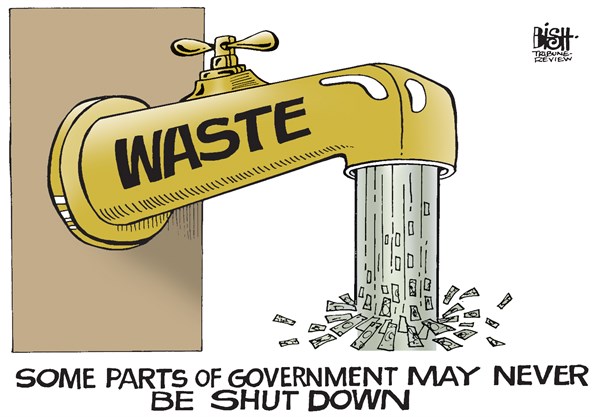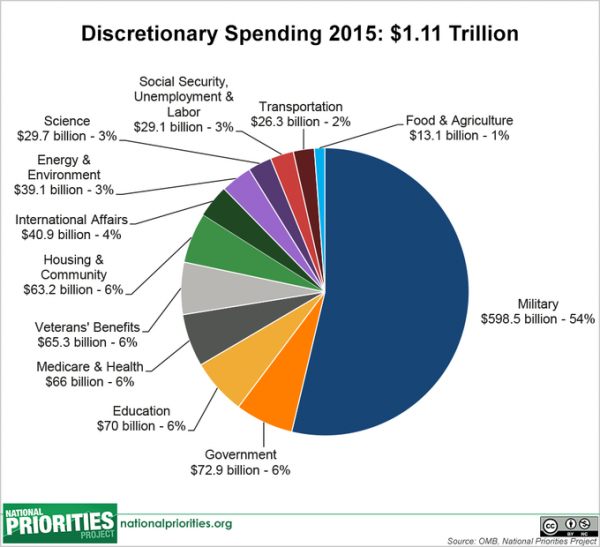In yet another disturbing example of wasteful government spending, the Washington Post reports that the Pentagon brass covered up an internal study suggesting that the military could save $125 billion in bureaucratic waste within 5 years:
The Pentagon has buried an internal study that exposed $125 billion in administrative waste in its business operations amid fears Congress would use the findings as an excuse to slash the defense budget, according to interviews and confidential memos obtained by The Washington Post.
Pentagon leaders had requested the study to help make their enormous back-office bureaucracy more efficient and reinvest any savings in combat power. But after the project documented far more wasteful spending than expected, senior defense officials moved swiftly to kill it by discrediting and suppressing the results.
The report, issued in January 2015, identified “a clear path” for the Defense Department to save $125 billion over five years. The plan would not have required layoffs of civil servants or reductions in military personnel. Instead, it would have streamlined the bureaucracy through attrition and early retirements, curtailed high-priced contractors and made better use of information technology.
Needless to say, the White House was quick to respond arguing that the report – Transforming DoD’s Core Business Processes for Revolutionary Change – was readily available to “anyone with a Web browser at the Pentagon website” since January, 2015.
With an annual budget of approximately $600 billion, $125 billion is not exactly pocket-change, even for politicians who prefer to propose one trillion dollar infrastructure spending plans.
A large portion of these “bureaucratic savings” could well be applied to modernizing our armed forces and provide better equipment and training to men and women in uniform. In fact, the Perfumed Princes on the E-Ring reportedly preferred to hide these inefficiencies from the public so that the “savings” could be applied to new programs.
While it is clear that the internal study (McKinsey & Co.) exists, it is not evident that the recommendations are “owned” by military leaders and are currently being implemented. After all, it has been almost two years since the plan was published. What I would like to see is a progress report to determine what concrete steps have been taken to implement McKinsey & Co.’s recommendations.
Having been subjected to many McKinsey studies in my prior corporate life, it is reassuring to see that the presentation format and buzzwords haven’t changed much in over 30 years. Frankly, many of these studies are sponsored by “change agents” who have little confidence in the managers responsible for the efficiency of the organization.
Implementing these changes effectively means ridding the organization of embedded staff and consultants that account for a large percentage of these bureaucratic costs. There are not many “leaders” (corporate or military) willing to act on these well-meaning recommendations when the lives of friends and acquaintances are on the line.
While it may seem politically fashionable to use the alleged cover-up to draw attention to yourself on Capitol Hill, the current and new administration would do well to implement many of the recommendations rather than confine the study to a circular file (i.e. garbage can). Sadly, I am not convinced that the Military Brass will do so unless both Congress and the new Administration hold their feet to the fire.
Specifically, a “Project Manager” should be identified and appointed for each major component of the Bureaucratic Waste Recommendations and quarterly reports should be made publically available to assess progress.
The U.S. military budget accounts for some 54% of discretionary spending by the government and represents 37% of worldwide military expenditures.
$125 billion is a lot of inefficiency that could be better redeployed modernizing our military and allocated to other needy government programs.
Expecting the same military people who have created these inefficiencies to improve productivity is, in my opinion, a fool’s errand.
ShareDEC
2016



About the Author:
Vietnam vintage US Army officer who honors the brave men and women who serve our country.